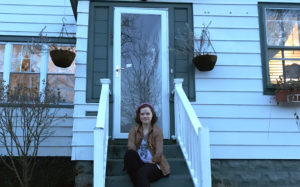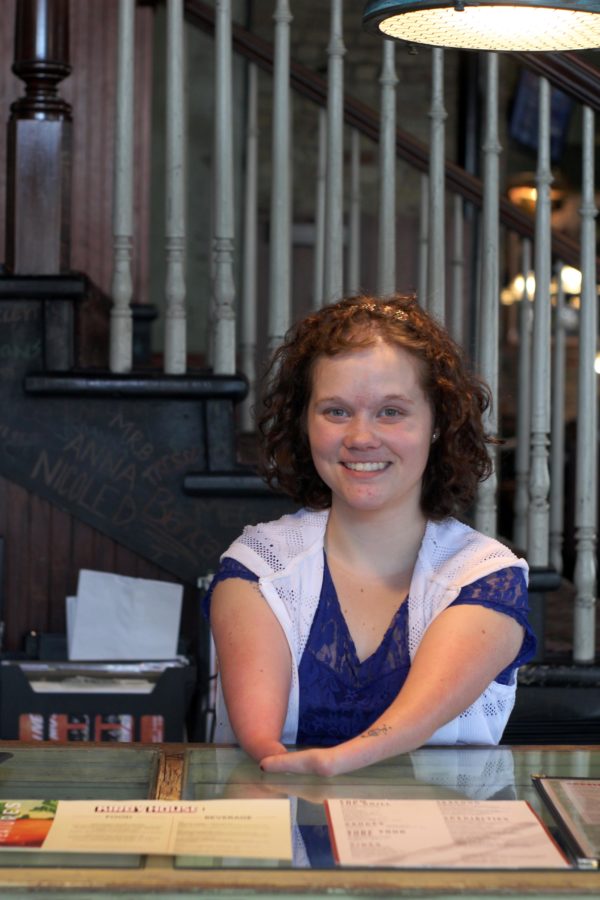Brittany Vandoorne: The Realist
April 13, 2017
WORKING HARD: Vandoorne smiles while she hostesses at the Kirby House. She has worked there for around a year, saving money for housing and, hopefully, college. She says she has struggled to find a job, since she has to fight against the stigmas of disability and homelessness.
While most 20-year-olds are thinking about what to do when they graduate college, Brittany Vandoorne, a 2014 GHHS graduate, is worrying about where she will be living in next two months.
She currently lives with three roommates in a seasonal rental downtown Grand Haven, just a short walk away from where she works.
“I’m supposed to be out in May,” Vandoorne said of her current residence. “I don’t know where I’m going to go next.”
This isn’t the first time she’s been unaware of what her living situation will change to.
Vandoorne has been homeless for two years.
She was adopted from her birth parents by her aunt and uncle when she was 11. According to Vandoorne, her parents were poor, but chose to spend what little money they had on drugs and alcohol instead of caring for their children. Her aunt and uncle raised her until she was forced to move out for repeatedly breaking family rules.
According to the National Conference of State Legislatures, individuals aged 12 to 17 are more at risk of being homeless than other age groups. Vandoorne was 18.
She then lived with her grandparents for several months before moving to the Hope House, a homeless shelter run by Love In Action. It houses women and children, but men are moved to the Harbor Hall, a program also serviced by Love In Action. An application is required to be accepted into the shelter.
Vandoorne says she was suffering from depression during the time and eventually was removed from the home after three months.
“I was kind of brand new to the homeless thing so I was depressed, I didn’t really want to be in the world and I didn’t want anything to do with anybody,” Vandoorne said. “I was mad at myself for making a mistake that cause me to get kicked out of my parents’ house. I was always hidden. But living there was actually pretty good for me because I was under a roof with bedding with blankets with food. There was a point where I got kicked out because I was having suicidal thoughts and they wanted me to get help.”
Vandoorne stayed at a hospital for two weeks because of her mental health. Desperate for release, she called her friend Kate, who took Vandoorne into her home for four months. With the help of Kate and her parents, Vandoorne was able to finally find a job at a local restaurant, the Kirby House, where she still works. However, she believes that getting hired was one of the toughest obstacles she faced because of the misconceptions some have about homeless individuals.
“I guess just to people, homeless people don’t work hard.” Vandoorne said. “That’s just what people put in their minds. Before I was homeless I was that kind of person too. I would look at a homeless person and think, ‘You could totally just get a job,’ but now I see where they’re coming from.”
Not only did she have to deal with the stigmas of being homeless, but Vandoorne also had to fight to prove she was a viable candidate despite her disability. She suffers from a birth defect that caused her to be born without hands.
“A lot of the jobs that I apply for, there are certain things I can do, but there’s always that one thing that I can’t do,” Vandoorne said. “Sometimes I just wish people would let me show them all the things I’m able to do even though I don’t have hands.”
After Vandoorne got the job at the restaurant, she wanted to move out of her friend’s home, so she applied to live at the Hope House again. Despite having a positive experience when she stayed in the shelter previously, she says that there were pressures to leave quickly.
“Don’t get me wrong, it’s nice to have a bed and a place to go, but it’s stressful and they try to get you out as fast as possible,” Vandoorne said. “But sometimes when you’re homeless, people won’t hire you right away because you don’t have the proper clothing or you’re not super clean so it’s kind of hard to be rushed out of a homeless shelter.”
She stayed there for around two months before she was kicked out for arriving late during Coast Guard Festival. According to Vandoorne, the shelter had mentioned their strictness regarding rules like curfew but they allowed anyone who held a job to be a few minutes late, depending on their shift hours. However, she says they didn’t account for the heavy traffic that the annual celebration brought along with it.
“I was 10 minutes late and they were like, ‘You’re late for curfew, we can’t have you here, you have to leave right now, you have 30 minutes to pack up,’ even though I was working that night,” Vandoorne said. “I was a little stressed.”
Hope House said they cannot comment on specific cases but they do stress the importance of the shelter rules to all of its inhabitants.
Discouraged and out of options, Vandoorne moved in with her then-boyfriend.
“He just wasn’t the greatest for me,” Vandoorne said, her mood sombered. “I’d just sit on his couch and think, ‘I’m never going to leave this place and if I do, I’m going to be on the streets.’ It was really tough. I started to feel depressed about myself. Leaving him was probably the best thing for me.”
She suffered through weeks of feeling isolated, depressed and defeated when she got a message from one of her former-roommates from the Hope House.
“If my roommates had never texted me and asked me if I wanted to move in with them, I’d probably still be there,” Vandoorne said.
Laura, who is in her 50’s, was Vandoorne’s roommate from the first time at the Hope House and was the one that contacted her about the seasonal rental. Together they got in touch with Kelly, who roomed with Vandoorne during her second stay at the shelter, and Katherine, who was an Resident Advisor at the Hope House. Even though all three are more than ten years older than her, Vandoorne says that she thoroughly enjoys their company.
“Having people that have also had struggles too along side me make it easier,” Vandoorne said. “I’d say that now is the best I’ve been in a long time, probably two years.”
Although her current living situation is coming to a close and the uncertainty of where she will be in the coming months is looming over her shoulder, Vandoorne continues to focus on building her future.
“I actually really do want to go to college,” Vandoorne said. “It’s something I really want to do. My birth family didn’t go to college so I want to be the one person in my birth family that actually did something.”
She tries to keep her ambitions realistic, however.

SEASONAL SITUATION: Vandoorne poses on the front steps of her current home. She’s been staying there for several months, but as summer draws nearer, the pressure of finding a new home grows heavier on her shoulders. Vandoorne has been moving from place to place for two years, and is hoping that she will soon be able to find a more permanent apartment to live year-round.
“I used to have huge goals,” Vandoorne said. “I used to want to be a social worker and help people but college is so expensive and I don’t have that money and I don’t know when I’ll get that money. My goal is at least to get a full-time job and be able to keep that and live in an apartment. That’s pretty much my goal right now because my goals are so little since I know I can’t get to the biggest one.”
Despite having to keep her objectives small and the unpredictability of her living situation over the past two years, Vandoorne choses to see the good that has come out of her experiences.
“I believe that it is made me stronger,” Vandoorne said. “There are times where I’m like sitting there and I’m just thinking, ‘How am I going to do this, I’m not going to make it, I should just give up, I should just kill myself.’ But I’m still alive. I know how strong I am now because of this.”
